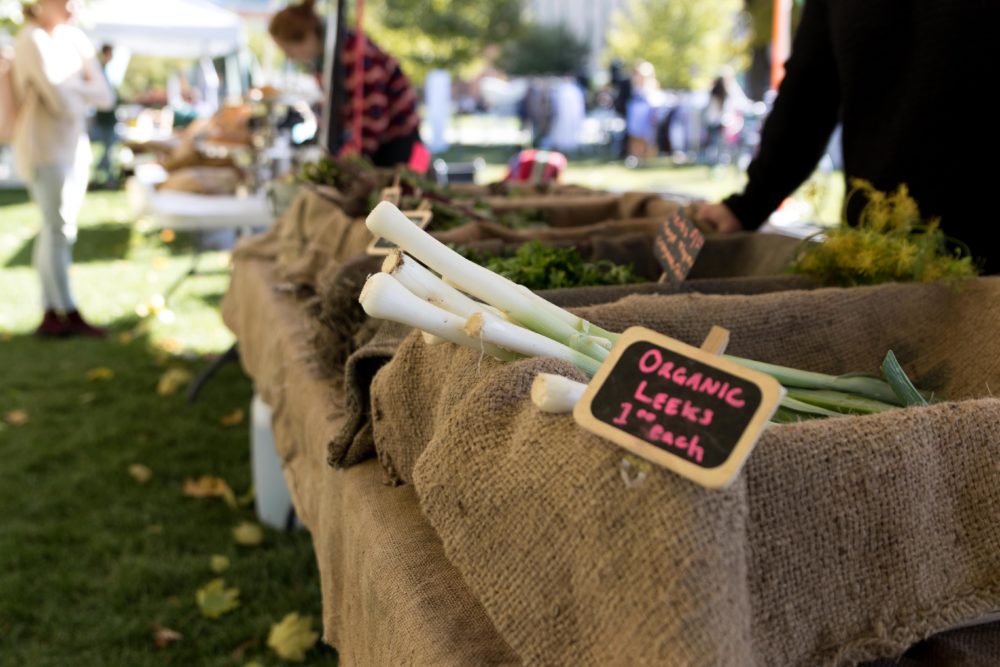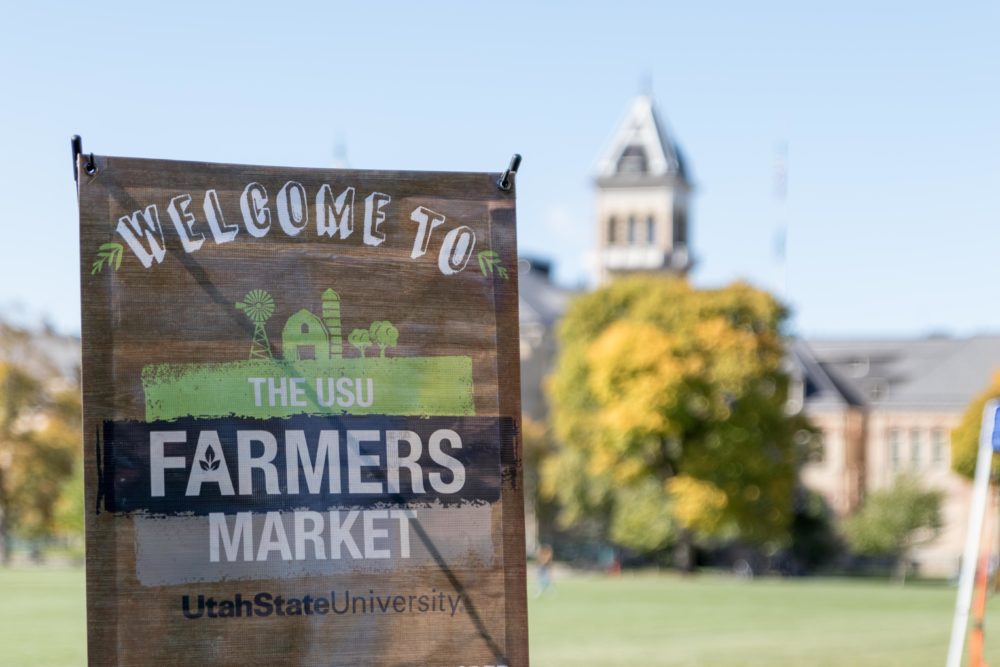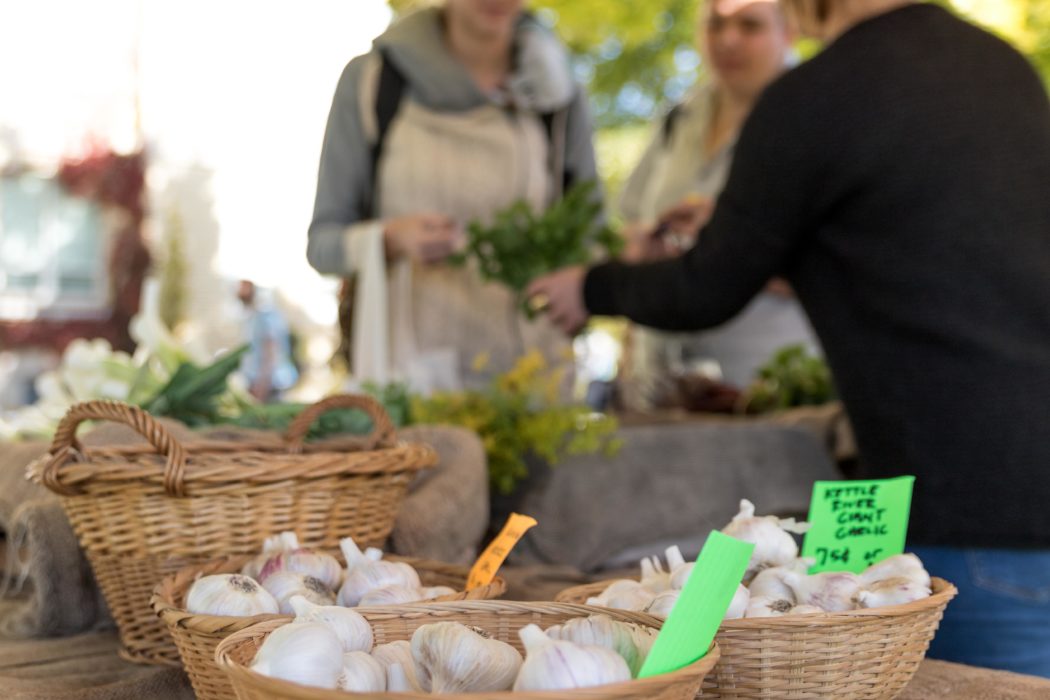USU students gain hand-on sustainable farming experience at the Student Organic Farm
USU’s Student Organic Farm finished another harvest and farmer’s market season with a fall festival Saturday, Oct 14.
The Student Organic Farm broke ground, on a third of an acre plot, in the spring of 2008. The farm uses organic means of growing and harvesting a variety of foods including: raspberries, swiss chard, squash, several herbs, melons, cauliflower, pumpkins and much more.
The farm is ran through the Center for Civic Engagement and Service-Learning and is supervised by Dr. Jennifer Reeve, a professor of plants, soil and climate (PSC). However the farm is managed by student interns and volunteers.
Sierra Zardus, an intern at the farm and senior studying plant science, said the primary purpose of the farm is to help students gain hands-on experience and learn about sustainability and organic farming practices.
“(The Organic Farm) has been a great way for me to apply my knowledge,” she said. “I’ve learned a lot in my classes, but in college you don’t really get an opportunity to go out and on a farm. So now I get to actually practice what I’m learning in my classes.”
 Miranda Lorenc
Miranda Lorenc Zardus started volunteering with the Organic Farm her freshman year after learning about the program at the Day on the Quad. After a couple of years, she became a paid intern and is planning on being the manager for the farm next season.
We’ve had a variety of students that have worked there,” she said, “Some with a lot of experience some who have very little. It’s a great thing for everyone. For people that already know a lot they can maybe help teach others or just to expand their own knowledge and for people that are brand new they get to learn a lot.”
The farm also acts as business and has around 55 community supported agriculture (CSA) crop shares, where community members pay into a share of the farm and receive a portion of the harvests. Shareholders will receive their share each week starting in May till generally the end of September.
The Organic Farm also participates in the weekly farmer’s market on the Quad.
Zardus said the farmers market has allowed the Organic farm to connect with the USU community and the broader Logan community, especially those interested in organic farming and sustainability.

Besides connecting with the broader Logan community, Zackary Webb, an intern at the farm, said the farm creates a great opportunity for people to connect.
Webb, being an advocate for sustainability, got involved with the Organic Farm through the Student Organization for Society and Natural Resources (SOFSNR.) He enjoys working at the farm because it is local agriculture and creates community agriculture.
“Ideally if Students came together and weeded, planted and worked on a farm together,” Webb said. “I feel like that they would be able to socialize better. I think that it’s the best social experience that there is. I think that when people can work with the food and the plants that they eat then they are connecting over something that they all have in common: food.”
Webb said they would like to see more student volunteers for the next season. They had on average eight students volunteer at the farm per week, but Webb would like to see that number go up to 20.
“With volunteering, you pay with your time and you get a social experience unlike any other,” Webb said.
Organic farming differs from conventional farming in practices that restricts uses of things like pesticides and fertilizer to only ones that are organic. The student farm specifically emphasizes integrated pest management (IPM): combining mechanical, biological and cultural methods to manage pests.
Ayla Stults-Lopez, manager and plant science major, said organic farming is definitely harder than conventional farmer.
“It’s definitely harder, but I think that it’s worth it,” said Stults-Lopez, “I feel better about it. Even the stuff that we take from the farm, I feel much better about it when I take it home. It tastes better. Our carrots taste way better than store-bought carrots.”
Stults-Lopez is planning on using the knowledge she learned from this season to help people in urban areas grow their own produce and practice sustainability practices.
— @Dirtyghettopass
Dillanpassmore@aggiemail.usu.edu


“Sustainability” and “organic” unfortunately don’t go together quite as well as one would hope. Natural, organic pesticides are more toxic and need to be used in higher amounts than conventional synthetic pesticides, and organic farming requires more land and other resources for the same yields as genetically engineered crops.
Not to mention the dirty business tactics of organic food companies, the Organic Consumers Association, etc.